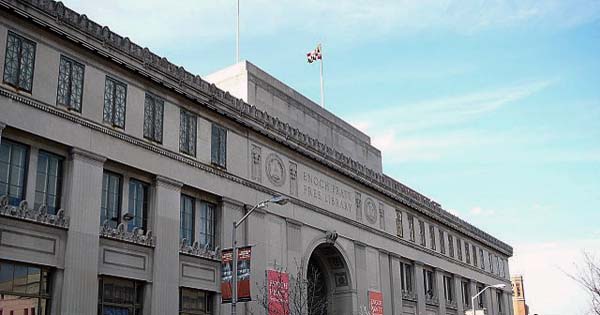
Last Saturday my wife and I drove up to Baltimore for Mencken Day. This is the annual celebration, held at the Enoch Pratt Free Library, honoring Henry Louis Mencken (1880-1956), our country’s most famous, or notorious, journalist, the self-appointed scourge of the philistines.
During the day’s festivities, a morning session is devoted to a meeting of The Mencken Society, with a speaker, and the afternoon to the annual Mencken Memorial Lecture. Last year I pronounced the afternoon talk, my subject being “The Literary Journalist in the Age of H. L. Mencken.” I focused mainly on the Chicago bookman Vincent Starrett, the Saturday Review of Literature columnist Christopher Morley, and, just in passing, that long-lived man of letters and Book-of-the-Month Club judge, Clifton Fadiman.
Last year, being flattered to have addressed the Mencken Society, I felt that the least I could do was join it. Just as rich people congregate at country clubs and crackpots form secret societies, I seem to gravitate to small and specialized literary groups to which I contribute annual dues and occasionally lend somewhat more active support.
Some of these organizations include the North American Jules Verne Society, the Lewis Carroll Society of North America, the National Capital Panthans (for devotees of Edgar Rice Burroughs), the Ghost Story Society, and, a somewhat larger group, the Baker Street Irregulars. I once belonged to the Tilling Society, an association for admirers of E. F. Benson’s comic Lucia novels, and plan to rejoin the Arthur Machen Society, which honors a multi-talented author best known for his supernatural fiction, including The Great God Pan, and his lyrical-mystical novel The Hill of Dreams. I am also proud to be a member of much larger entities such as the Mystery Writers of America and the Science Fiction Writers of America.
It nonetheless surprises me that I’ve become involved, however minimally, with all these associations and sodalities. For most of my life, I’ve regarded myself as a non-joiner, suspicious of any sort of collective behavior or corporate bonhomie. It was a source of pride that my college, Oberlin, prohibited fraternities and sororities. Every sort of Rotarian glad-handing appalls me. Crowds tend to oppress my spirits. I identify with Kipling’s “Cat that walked by himself.”
And, yet, I’ve discovered, you have to get out, you do need to see other human beings. You can’t just read and write all day—much as I’d like to. After a few hours in a chair, my body grows achy, my brain feels even mushier than usual, my tired eyes start to hurt. To refresh myself I usually go for a walk, or, if I’m feeling virtuous and resolute, I’ll hike over to the gym to lift weights or run on the treadmill. At other times, I just change my workplace, often heading to the library—where I’m typing now—simply to be surrounded by other people while I read or write. It’s somehow relaxing to hear patrons asking about recorded books, or glimpse high-school students quietly flirting.
Years ago, when I was in graduate school, I took to polishing chapters of my dissertation late at night in a local McDonald’s. It should have been distracting, as truckers, prostitutes and police officers dropped by after midnight for coffee or Big Macs. It wasn’t. I remember feeling astonishingly serene, with my three-ring binder of notes and the 300-page rough draft of my analysis of Stendhal’s autobiographical La Vie de Henry Brulard. Did I know then that Bertolt Brecht liked to write his plays in rooms filled with people, in effect, at parties? He felt it kept him connected with his audience. I was certainly aware that Sartre, Simone de Beauvoir, and all the other existentialists scribbled their treatises and novels and poems over cups of espresso at the Café de Flore or La Rotonde.
The air here in the library is fresh, and the susurration of low voices surprisingly restful, a background hum like that produced by those white-noise sleep machines. Of course, I always feel happy in libraries and bookstores. They restoreth my soul. Pathetic, I suppose. But there you are.
My affiliation with literary sodalities provides a similar kind of R and R. I love their bookish shoptalk. Being around collectors and passionate readers, whether of Alice’s Adventures in Wonderland or the Tarzan books or the Voyages Extraordinaires, is exhilarating. I get caught up in other people’s enthusiasm for their favorite authors. Before I know it, I’m daydreaming about spending a winter reading all of Burroughs, or of collecting the Hetzel editions of Jules Verne, or of writing a study of classic children’s authors.
After the morning lecture—by H. George Hahn on Mencken’s satire—Marian and I had a little time before lunch, so we visited the impressive Basilica of the Assumption across the street from the Pratt library: if the Shakers or Zen Buddhists were to design a Catholic cathedral, it might look like this—plain white walls and fixtures, an elegant dome, brilliant natural sunlight streaming in, a design of classical simplicity and clarity. After one awed glance, my wife immediately murmured that the church might almost be the work of Benjamin Latrobe, the architect of the Capitol. As it turned out, it was.
We stayed for the afternoon talk—in which Richard Schrader revealed how slanted and inaccurate Mencken’s account of the Scopes evolution trial had been—and afterwards chatted a bit over cookies and punch with some members of the Mencken Society and a young guy who turned out to be chairman of the North American Discworld Convention. He reminded me that the con—a celebration of the fantasy fiction of Terry Pratchett—would be in Baltimore next year. I suspect I’ll be there. How can I resist becoming involved with yet one more specialized literary group? Besides, I’ve loved Pratchett ever since I read his novel about a Discworld newspaper with the perfect motto: “The Truth Will Make You Fret.”

